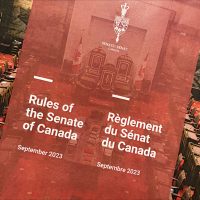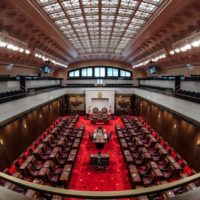Senate Renewal
Why the Senate needs external oversight over expenses
Allowing a few outside individuals into the Senate’s governance structure will go a long way towards addressing the institution’s credibility deficit, writes Senator Peter Harder.
This article was originally published in Policy Options on November 14, 2018.
Few Canadians with an interest in the recent evolution of the Senate could credibly deny that the upper chamber is becoming a better place. Thanks to a new arm’s-length and independent appointment process, the Senate is slowly rebuilding its reputation.
But it’s also true that the upper chamber continues to have a credibility deficit with the Canadian public, seen in the results of a recent Nanos poll published in Policy Options. It found that while Canadians are supportive of a more independent Senate, only a quarter have a positive or somewhat positive impression of senators. When asked what words come to mind when thinking of the Senate of Canada, unprompted, 12 percent said “waste of money.”
So while the Senate has made considerable strides, it needs to do more.
To this end, Senators are currently seeking to improve the institution’s auditing and oversight regime through the creation of a new body. The proposed audit and oversight committee (AOC) presents an opportunity to send a clear message to Canadians that Senators do not fear the frank advice and scrutiny of outside experts in the audit of expenditures, to help ensure that the Senate is providing value for money.
Basic tenets of good governance require that the AOC include members from outside the Senate to represent the public interest.
They could include an expert in corporate governance, an expert in public institutions and a former judge. Canada’s Auditor General recommended in 2015 that oversight be performed by a body whose membership, including its chair, contains persons independent of the Senate.
Alas, some senators are insisting that the new AOC be composed of Senators only. This is the wrong way to go.
In an oversight committee without outsiders, one group of Senators would oversee and pass judgment on other Senators, a model that raises an appearance of conflict of interest. This approach also fails to address the Auditor General’s recommendation.
Refusing to include outside voices would, in time, come back to haunt the Senate. If its stewardship of taxpayer dollars is questioned again, the public will focus on the AOC, questioning its governance structure, performance and membership. Canadians would rightly ask whether the correct lessons were learned in the wake of the Senate expense scandal that was top of mind during the 2015 election campaign.
Thankfully, it is not too late for a course correction. The issue is being studied by the Senate’s Standing Committee on Rules, Procedures and the Rights of Parliament. Its members should heed the views of many senators who have been vocal about the need for outside voices, including former editorialist André Pratte, audit and governance specialist Lucie Moncion and human rights lawyer Marilou McPhedran.
Those who argue against the inclusion of outside experts claim that their presence would unduly interfere with the Senate’s parliamentary privilege as a self-governing body. But this attitude sends the message to Canadians that Senators are more concerned with their privileges than with gaining public trust. The Senate belongs to 36 million Canadians, and it is precisely because it was not kept in good order in the years preceding the Senate expense scandal that many informed voices — including current and former senators, the Auditor General, the Master of Massey College, Hugh Segal, (a former senator) and a former Senate ethics officer — have called for an oversight component with external membership.
But while the argument of parliamentary privilege should be taken seriously, its deployment in this debate is not suitable. To date, the argument has been presented in the abstract as incontestable, without any genuine study of how external membership on the oversight panel could be made to coexist, rather than interfere, with the Senate’s privileges.
The principle that the Senate is a self-governing body does not preclude the inclusion of an external component on the oversight committee.
Yes, Senators are masters of their own house. But this is precisely why the Senate may choose to involve outside professionals in its AOC. Far from undermining this privilege, the inclusion of external members would constitute an appropriate and welcome exercise of the Senate’s privileges. In the end, the Senate as a chamber would remain supreme, and the arrangements could be undone if that is its will.
Most Canadian provinces have gone farther than what is being proposed in Ottawa. Provincial auditors general have a legislative mandate to audit the spending of the legislative assemblies in Alberta, British Columbia, Manitoba, New Brunswick, Newfoundland and Labrador, Nova Scotia and Ontario.
In addition, other Westminster parliamentary institutions have grappled with this issue. While our Commonwealth cousins in the United Kingdom House of Commons and in the Australian Parliament are no less self-governing, they have established robust audit and oversight bodies composed only of external members. The Australian Parliament created its body in 2017 in response to its own scandals. As for the UK House of Commons, following reports of wasteful spending by MPs, the Independent Parliamentary Standards Authority (IPSA) was established. These bodies are entirely external, but their size, scope and cost go farther than what is required for the Canadian Senate.
The House of Lords opted for a more modest approach that is worth consideration: an audit committee that includes not only members of the House but also two external members, including the chairperson. This approach is more in line with what many believe is required in the Senate.
But perhaps the most fitting model of all is the advisory audit committee created in Newfoundland and Labrador in the wake of the constituency allowance scandal of 2006, with one half of its membership external. That controversy led to a landmark report by Justice Derek Green, which made a series of recommendations that were enacted within days. In his report, Green said external membership would provide an independent and informed point of view on financial matters, so that the audit committee would become a watchdog over the legislature’s financial mismanagement.
The Green report led to the establishment of a legislative committee consisting of two elected members, one of whom must come from the opposition side, as well as two external members chosen by the province’s chief justice. Functioning as an advisory subcommittee of the Management Commission (equivalent to the Senate’s Standing Committee of Internal Economy, Budgets and Administration), the audit committee has a mandate to provide assistance to the commission in fulfilling its financial management responsibility to the House of Assembly. For Green, the question was not so much whether an external component of oversight was required, but rather how external members could be included on a panel without interfering with House privileges. He concluded that because the audit committee would act as an advisory body, the presence of external members would not undermine the privileges of the House. This compromise may present a good starting point for the Senate as it grapples with the art of the possible.
To my knowledge, the Senate committees that have studied the issue of oversight have not heard publicly from any witnesses with experience in any of the jurisdictions that have adopted audit and oversight bodies with external members. Senators had originally understood that a thorough study of the issue would occur at the rules committee — complete with the direct evidence of relevant witnesses from outside the Senate. Hearing from Green would be a good start.
Ultimately, the Senate should do everything in its power to demonstrate that it welcomes the probing eye of the public and the scrutiny of outside experts.
While the issue of parliamentary privilege presents a challenge, precedents in Canada and abroad prove that it is by no means insurmountable. The experience of Newfoundland and Labrador helps to prove that creative solutions can be found in the creation of a watchdog committee that acts in an advisory role.
There is no ambiguity as to where the ultimate power lies; nor, however, is there a question about the political cost of ignoring the advice of external members.
Senators have a duty, as the custodians of this branch of Parliament, to do everything possible to address the institution’s credibility deficit. Allowing a few outside individuals into its governance structure would go a long way.
For me, the inclusion of nonsenators on the AOC is a requirement for moving forward. If a majority of Senators choose instead to move forward without this essential feature, they will do so without my support.





















































